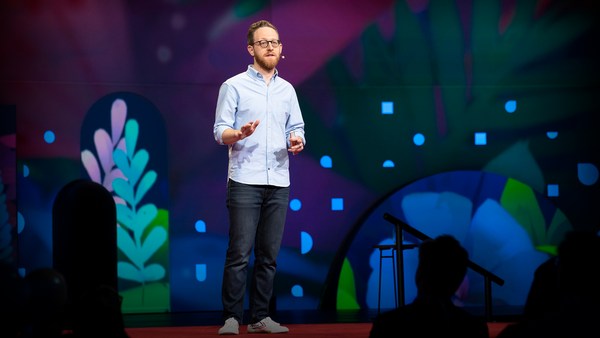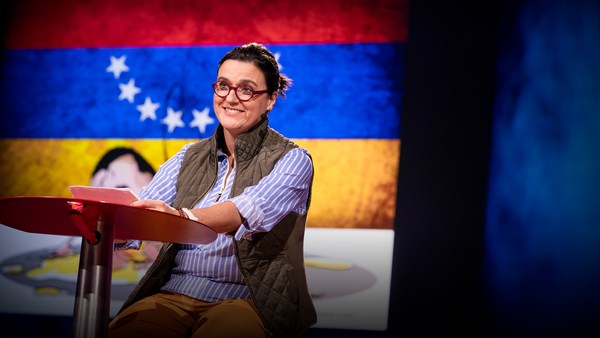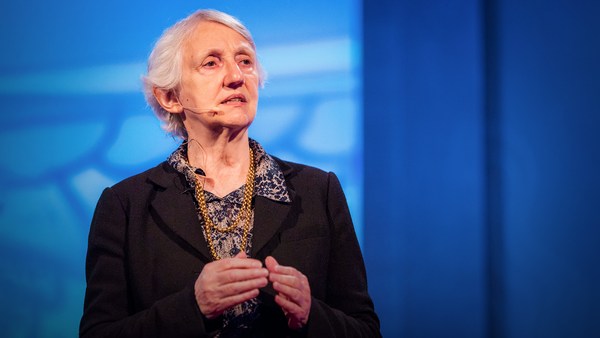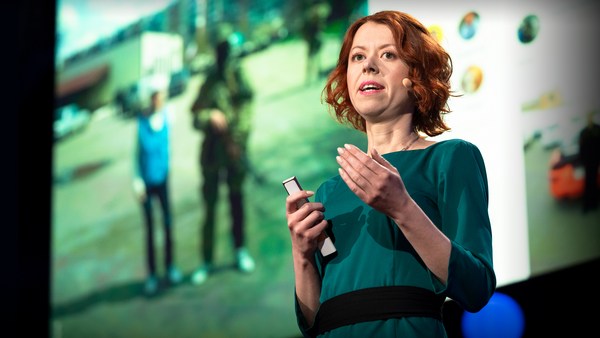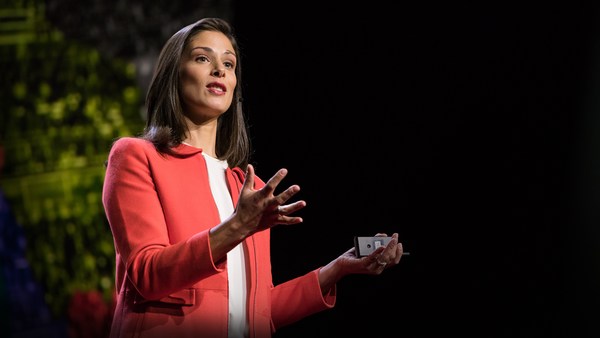How can one engage audiences that seem to be living in an alternative reality? How do we reach people who seem smitten, besotted with the propaganda of sadistic strongmen? That's the sort of happy stuff that I work on, that I write books about, that I research at university, and that has become very, very personal for me in the last couple of years.
I was born in Ukraine, and since the full-scale invasion began, I've been going to Ukraine a lot to work with an NGO called the Reckoning Project to document war crimes and to tell the truth about them to an often skeptical world. I'm afraid there's a lot of atrocities that we document. I was in the town of Bucha when it was liberated from Russian forces, entered the village to see hundreds of bodies strewn around being placed in a mass grave. And these people were killed, not because, like, you know, a missile landed on them by accident, they were just shot for fun by Russian soldiers just to prove they had the power over them. There was no military sense to this atrocity.
And I remember talking to a Ukrainian general as we watched these dead bodies being piled in to a grave, and he was in shock. He'd liberated the village, but he was also in shock because he'd actually spent a lot of time in Russia itself. He'd actually studied to be a soldier there. He had lots of former students that he'd studied with there, former colleagues, and ever since the war had begun, he'd been calling them, saying, "Please do something to stop this horrific war." And they just throw the phones down. And so many Ukrainians were calling their Russian relatives there, well, now-former friends and saying, "Please do something to stop this war. At least stop your sons from going to fight in this war." And at the other end, they'd hear people who they'd known all their lives answering in the cliches of Russian propaganda, saying, "You're making it up," "You've made some sort of mistake," or saying, "You know, probably your side just bombed itself by accident," or saying "It's all fake, you're making it all up." And on Russian TV at the time, you'd hear these increasingly absurd, you know, propaganda pieces about atrocities like Bucha.
I'll give you one example. After the atrocities of Bucha were discovered to the world, mainstream Russian TV, 7pm -- this is not some sort of kooky YouTube channel -- mainstream Russian TV was claiming that the British secret services had engineered a fake atrocity in Bucha. The whole thing was staged. And you know why and how they knew it was staged by the British? Because the place was called Bucha, which in English sounds like butcher, and only the English, this very literary people, would concoct an atrocity in a place which sounded like the word butcher, and that was their proof. And people would, you know, repeat this absurd propaganda.
And look, Russia is an extreme, a horrific example of people not wanting to live in reality. But I've been living in the US a couple of years, and I see quite a lot of it here, tens of millions, maybe more, people who seem to genuinely believe that the last election was rigged, despite sort of court cases proving that it wasn't.
So what can we do about it? You know, I'm in a community of researchers, of academics, of journalists who've been trying many things for the last sort of decade, really. We've tried fact-checking, but we've also found that, you know, when facts challenge people's identity, they kind of just bounce off. We've tried worthy journalism. You know, these great liberal newspapers lecturing people about how important it is to save democracy. I've written many columns like that myself. But I know that I'm preaching to the converted. I know that I'm within my own, you know, liberal echo chamber, basically. How do we get beyond that? How can we reach the people who are somehow under the sway of this propaganda?
And in a kind of despair, I started to turn to history. Might there be something in history that gives us a clue about what we can do today? And that's how I discovered a very strange and somewhat forgotten story about a covert British operation to subvert Nazi propaganda. Perhaps the most, or one of the most reality-denying, sadistic, dehumanizing propagandas ever, Nazi propaganda. And it was led by this man. His name was Sefton Delmer. Largely forgotten person, but very, very famous in his day. Sefton Delmer kind of shared a lot of the frustrations that I have. He felt that, you know, at the start of the World War II, liberal media, in his case, the German service of the BBC or various kind of like, exiled pro-democracy groups who were still trying to communicate with the German people, trying to persuade them not to follow Hitler into his genocidal wars, he felt that they were doing it all wrong. They were lecturing people, a bit like we do today, about how democracy dies in darkness, how we must stop fascism. He felt all of that, just like a lot of media today, is trapped in its own echo chamber, preaching to the converted. He wanted to do something different, and he knew what he was talking about.
He'd grown up in Germany, he was British, but he grew up in Germany. He'd then been a journalist in the 1920s inside Germany, and he got very close to the Nazi elites when they were still rising. And he got to see their propaganda system from inside. And essentially, he could see that it was based on two or three principles, which are really very common to strongman propaganda today. The first of these was identification with the leader. What do we mean by that? Look, we often wonder, why do people follow leaders who are wildly narcissistic, sadistic, cruel, violent? You know, when people first saw Hitler appear, they thought he was, you know, some kind of freak. And yet this freak had a huge following. And Delmar worked out that these leaders were popular because they allow you, they allow their followers to be the narcissistic, sadistic, cruel people. That at some level, many of them, and maybe many of us, would sometimes like to be. They were normalizing our most vile feelings. Their very attractiveness was their nastiness.
Secondly, he could see how people could sort of sublimate their agency through these leaders, you know. These leaders could be their retribution. Yes, you are giving up a little bit of free will, but you could feel powerful through the leader.
And thirdly, this propaganda and these leaders created a sense of community. Germany in the 1920s, a little bit, a little bit like America today, was a place where the old economic order was being destroyed, where the old social norms were in chaos, where identities were in flux, even gender norms were being questioned. And in this time of exciting for some people, for others, very disturbing change, the Nazis said, "We know who you are. You're true Germans, You're better Germans than all these immigrants over here. You're the true people and we're part of one community, the Nazi "Volk," the Nazi people. We know who we are, and we’re together.”
So Delmer realized that in order to subvert the connection between Nazi propaganda and its followers, you had to really climb into the dark operating of human desire. The place where fact-checking can't really go. And so, based at Woburn Abbey, a rather fabulous British country house near London, he gathered around himself psychiatrists, spies, soldiers, academics, a lot of exiled cabaret artists from the German theater scene. He gathered them together and created this kind of covert media empire. Dozens of radio stations broadcasting into Nazi Germany and the rest of occupied Europe, newspapers, leaflets, this whole kind of factory of psychological subversion.
Now we don't have, sadly, the recordings of all these radio shows. However, we do have the transcripts. And when I realized these transcripts were available, I went, “Delicious.” And I started going through them. I actually spent a lot of COVID going through them. And they've been declassified from the British and the American archives. And as I went through these hundreds and hundreds and hundreds of pages, I realized there was kind of a pattern to them. They were experimenting like crazy. But there is, because this is a TED Talk, three, because it’s always three with TED Talks. There's three basic principles that I think Delmar kind of landed on through experimentation.
Number one, break the monopoly authoritarian propaganda has on strong emotions. That's the root of their power. So Delmar’s media, his radio stations, which were many and different, but they were all a lot unlike the BBC or the New York Times or the Washington Post. They were full of vitriol, anger, a lot of pornography. They were tapping into all the resentments that Germans were starting to feel about their leadership. They were full of these sort of like howls and laments about families that people were losing in the bombardment and then blaming the Nazis for not having provided the right air defense. They talk about how, you know, the SS Germans, sort of the Nazi elite secret police-type units, how they were living, you know, this corrupt life while normal German soldiers were suffering.
Here's just a little sort of clip from one of the shows. "The SS wear the German uniform, but they drag the German name in the mud. They should send them to the Eastern front. There, everything else but their penis would get stiff. There, they would get an idea how hard the German soldier has to fight for his good name while the SS clique does not give a shit about it."
It was full of expletives as well. There were all these scenes -- This is actually the most sort of like, un-X-rated bit of pornography I could find, which relates kind of like an orgy at an SS man's house. Like "SS man Thienemann has a Polish lover at home who is personally in charge of the bamboo canes, twigs, thin and thick leather straps with which Thienemann and his guests are strafing, her fat and large buttocks." And I had to cut it there because it gets quite -- it goes on.
So, you know, there's a reason to this. He wants to disrupt the emotional bond that people have to the Nazis. He wants to cover the Nazis in what he calls "a lair of filth and slime, as thick as the Nazis had covered the Jews." But his aim, once he's disrupted that, once he's sort of taken strong emotions back, is to create a space where you can introduce facts to people. He gave people advice about how to fake illness so that they could be sent home from the front. So it wasn't just any facts. It's facts that gave people back their agency, made them less dependent on their leaders.
And thirdly, he fostered alternative communities. If the Nazis gave you a sense of identity, a common sense of being part of the people, the "Volk," Delmar's shows stressed the church, the army, family, as these alternative bonds that people had. There's a very important thing in his shows. Basically, most of the shows he created would claim to be German shows. They would say, “We Germans.” They would be hosted by soldiers who'd just become POWs with the British. But the audience was meant to understand perfectly well that these were the British dressed up as Germans.
Now why did Delmer do that? Firstly, he made it safe for people to listen to the shows. If the Gestapo came along, you could say, "Well, I had no idea this was subversive. I thought this was German." It was psychologically safer. It was more comfortable for people to hear the word “Our soldiers, our boys” than “You Germans, you enemy.” But even more so, he was saying something else. He was saying, "Look we're the English dressed up as Germans. And we understand you, your gripes, your anger, what matters to you, better than the Nazis. And if we, your enemies, not in a culture war, but in a real war, can understand you better than your bosses, do you really need them? Are they really looking out for you when they say they're going to be your retribution, or are they just thinking about themselves?" 40 percent of German soldiers that were surveyed by the British in these little sort of snap polls they did, said they listened to this content.
So how can we bring that all back to today? Whether we're thinking about reaching Russians, whether we're thinking about reaching audiences caught up in what some academics call the far-right echo chamber? If we take Delmer's principles, they are much easier to activate today. We know far more from things like, I don't know, online sentiment analysis. We know far more about what makes people emotional, what things they react to in a visceral way. Delmar was just kind of shooting stuff -- well, literally shooting stuff into the ether. We know that so much more from today's data. When it comes to finding the facts that people care about, Delmar had to do it through partisans by opening up the letters of Nazi officials.
Today, even in a country like Russia, we have non-stop leaks about the corruption of mid-level officials. We can use satellite imagery to understand, essentially, has a road been fixed in a town and, you know, do a story about that. We have so much more data than Delmer had, but do we know how to use it to give people the facts that actually matter to them?
And when it comes to fostering communities, look, there are so many digital tools that we have today that can show how a media is responsive to its audience. I mean, there's a great project called Hearken, for example, which algorithmically collects what people care about in a town or in a topic and then gets journalists to really focus on the things that they're worried about. And there are so many digital tools that we had. So if we put these things together, the visceral emotion, the data that tells us the facts that people really care about the online use of communities, we can do something much more powerful than what Delmar did.
So ... Look, I know it's easy to despair. It's easy to despair when you hear people denying atrocities. It's easy to despair when we hear vast swathes of the American population living in an alternative reality. But before we give up, before we surrender, I think we can at least take some of Delmar's lessons, fuse them with modern technology, and really, really try to reach them.
Thank you.
(Applause)
